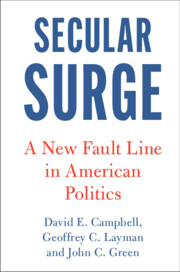Book contents
- Secular Surge
- Cambridge Studies in Social Theory, Religion, and Politics
- Secular Surge
- Copyright page
- Dedication
- Contents
- Figures
- Tables
- A Closer Look
- Preface
- Acknowledgments
- 1 The Secular Surge
- 2 America the Secular
- 3 Public Secularism
- 4 Secularism and Civic Engagement
- 5 Secularism and Political Attitudes
- 6 Nonreligiosity and Backlash Politics
- 7 Secularism and Party Politics
- 8 Secularism and the Democrats
- 9 Nonreligiosity and the Republicans
- 10 Secularism on the Stump
- 11 Beyond the Secular Surge
- Bibliography
- Index
9 - Nonreligiosity and the Republicans
Published online by Cambridge University Press: 14 January 2021
- Secular Surge
- Cambridge Studies in Social Theory, Religion, and Politics
- Secular Surge
- Copyright page
- Dedication
- Contents
- Figures
- Tables
- A Closer Look
- Preface
- Acknowledgments
- 1 The Secular Surge
- 2 America the Secular
- 3 Public Secularism
- 4 Secularism and Civic Engagement
- 5 Secularism and Political Attitudes
- 6 Nonreligiosity and Backlash Politics
- 7 Secularism and Party Politics
- 8 Secularism and the Democrats
- 9 Nonreligiosity and the Republicans
- 10 Secularism on the Stump
- 11 Beyond the Secular Surge
- Bibliography
- Index
Summary
Shows that although Secularists are concentrated in Democratic ranks, secularism and nonreligiosity both matter within the GOP as well. Among Republicans, there is a small but vocal group of Secularist libertarians. Like the Secularists on the political left, they have sharply defined ideological views. Even larger is the number of Non-Religionists who found favor with Donald Trump – less consistently ideological, perhaps, but no less passionate.
Keywords
- Type
- Chapter
- Information
- Secular SurgeA New Fault Line in American Politics, pp. 166 - 180Publisher: Cambridge University PressPrint publication year: 2020

